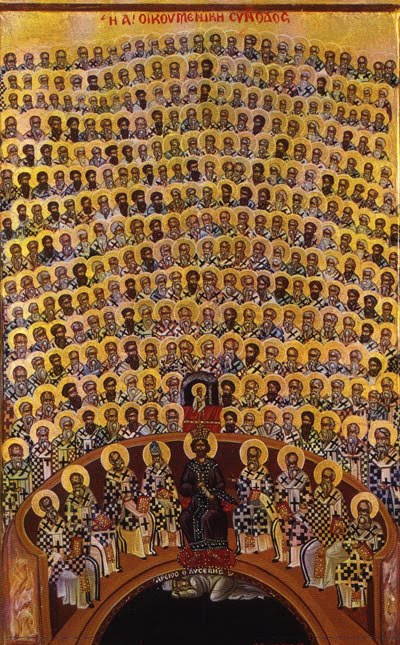The First Ecumenical Council Nicaea Disrupting Religious Doctrine
Ever wonder how core Christian beliefs were solidified? It wasn't a top-down decree. It was a messy, complex, and ultimately defining gathering – the First Ecumenical Council, held in Nicaea in 325 AD. This wasn’t just a meeting; it was a clash of theological titans, a showdown over the very nature of Christ, and a pivotal moment that would forever shape the trajectory of Christianity.
The First Council of Nicaea wasn't called on a whim. A rising tide of conflicting interpretations of Christian doctrine, particularly concerning the relationship between God the Father and Jesus Christ, threatened to fracture the burgeoning religion. The primary source of contention was the Arian controversy, spearheaded by Arius of Alexandria, who argued that Jesus, while divine, was a created being, subordinate to God the Father. This ignited a theological firestorm that demanded resolution.
Emperor Constantine, recognizing the destabilizing potential of this religious rift, convened the council in the city of Nicaea. Over 300 bishops, primarily from the East, gathered to debate, argue, and ultimately forge a unified understanding of Christian doctrine. Think of it as the original religious startup, grappling with fundamental questions of identity and purpose.
The central outcome of the First Ecumenical Council was the Nicene Creed. This foundational document, hammered out through intense deliberation and compromise, affirmed the consubstantiality of the Father and the Son, meaning that Jesus is of the same substance as God, co-eternal and equal in divinity. This declaration served as a powerful counterpunch to Arianism and provided a cornerstone for orthodox Christian theology.
Beyond the Nicene Creed, the council addressed other significant issues, including the calculation of Easter and establishing guidelines for church governance. The council's decisions reverberated throughout the Christian world, establishing a precedent for future ecumenical councils and solidifying the role of these gatherings in shaping religious doctrine. What emerged from Nicaea was more than just a creed; it was a framework for understanding Christian belief and practice.
The significance of the Council of Nicaea cannot be overstated. It established the precedent for resolving theological disputes through conciliar authority and provided a foundation for future theological developments. The council’s affirmation of the divinity of Christ is a core tenet of Christian belief to this day.
Arianism, the theological view that Jesus was a created being subordinate to God, is a crucial aspect to understanding the context and importance of the council. The council's rejection of Arianism solidified the understanding of the Trinity.
One benefit of the Council of Nicaea was the establishment of a unified Christian doctrine. This unity provided a shared foundation of belief and helped prevent fragmentation of the early Church.
Another benefit was the establishment of a process for resolving theological disputes. By bringing together leading thinkers to debate and decide on matters of doctrine, the council established a mechanism for addressing disagreements and maintaining unity within the church.
The council’s decisions also helped to clarify and strengthen the understanding of the Trinity. This clarified doctrine contributed to the stability and growth of the Christian faith.
Advantages and Disadvantages of the Council's Decisions
| Advantages | Disadvantages |
|---|---|
| Unified doctrine | Suppression of minority viewpoints |
| Process for dispute resolution | Potential for future conflicts |
Frequently Asked Questions about the First Council of Nicaea:
1. When was the First Council of Nicaea held? 325 AD.
2. Who convened the council? Emperor Constantine.
3. What was the primary issue addressed? The Arian controversy.
4. What was the main outcome of the council? The Nicene Creed.
5. What is the Nicene Creed? A statement of Christian belief.
6. Why is the Council of Nicaea important? It shaped Christian doctrine.
7. What was Arianism? The belief that Jesus was subordinate to God.
8. How did the council impact the church? It provided unity and a process for resolving disputes.
The First Council of Nicaea was a watershed moment in Christian history. It laid the groundwork for the development of Christian doctrine, established procedures for resolving theological disagreements, and solidified the core beliefs of the faith. This council’s legacy continues to influence Christian thought and practice to this day. Understanding the context, decisions, and impact of this first ecumenical council is essential for anyone seeking a deeper comprehension of Christianity. By exploring the origins and ramifications of this pivotal event, we gain valuable insight into the evolution of religious thought and its ongoing influence on the world.
Fathers of the First Six Councils | Kennecott Land

Sunday of the Fathers of the First Six Councils OrthoChristianCom | Kennecott Land

ORTHODOX CHRISTIANITY THEN AND NOW Sunday of the Holy and God | Kennecott Land

First Council of Nicaea Illustration | Kennecott Land

what was the first ecumenical council | Kennecott Land

what was the first ecumenical council | Kennecott Land

what was the first ecumenical council | Kennecott Land

First Ecumenical Council 325 AD by Masha Burganova | Kennecott Land

The First Ecumenical Council ikon from the Church of St A | Kennecott Land
:max_bytes(150000):strip_icc()/council-of-nicea-56a48fa23df78cf77282faa0.jpg)
The Council of Nicea and the Arian Controversy | Kennecott Land

The Liturgical Guide and Bulletin for Sunday June 13th 2021 | Kennecott Land

Enduring No Blasphemy OrthoChristianCom | Kennecott Land

The First Ecumenical Council and Our Challenge Today OrthoChristianCom | Kennecott Land